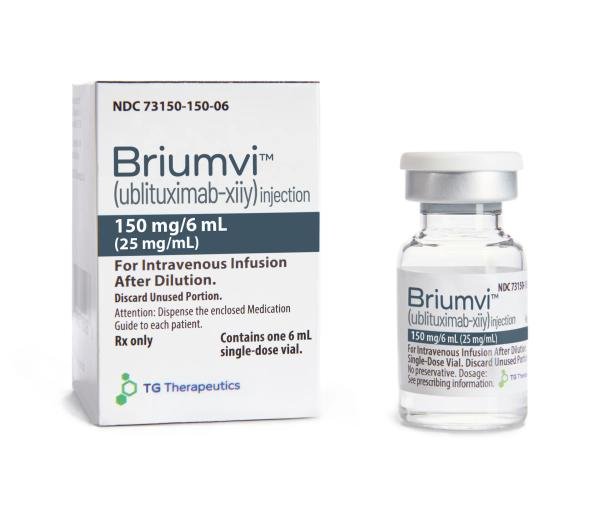
TG Therapeutics Conducting Two Post-Marketing Studies on Briumvi During Pregnancy and Breastfeeding
Introduction
TG Therapeutics is conducting two post-marketing studies to evaluate the safety of Briumvi among people with relapsing forms of multiple sclerosis (MS) who are pregnant or breastfeeding, as well as their babies. The company aims to generate data on the use of Briumvi during pregnancy and lactation to help doctors make evidence-based decisions for women who are pregnant or planning to become pregnant. The studies’ designs were presented by Dr. Riley Bove, a neurologist at the University of California’s Weill Institute of Neurosciences, at the 2024 Consortium of Multiple Sclerosis Centers (CMSC) annual meeting.
About Briumvi and Its Mechanism of Action
Briumvi (ublituximab-xiiy) is a disease-modifying therapy approved in the US and Europe to reduce disease activity and slow disability progression in adults with relapsing forms of MS. Briumvi works by inhibiting a protein called CD20 on the surface of immune B-cells, causing their death. B-cells are thought to participate, along with other immune cells, in the inflammatory attacks that drive MS. Given every six months as an hour-long infusion into the bloodstream, Briumvi is a relatively new treatment for MS.
Why Is the Safety of Briumvi Important for Pregnant Women?
When a therapy is initially approved, there are usually no pregnancy or lactation data collected in humans to support its safe use in people of child-bearing age. As such, such data are generally collected only after the therapy has entered the market. Because there are limited data on the use of Briumvi in pregnant or breastfeeding people, it’s recommended that women of child-bearing age take a pregnancy test before each dose and use birth control during treatment and for at least six months after the last dose. Animal studies have suggested that Briumvi may be harmful to a developing fetus, so patients who are pregnant or planning to get pregnant should talk to their doctors before using Briumvi.
The PROVIDE Post-Marketing Study to Evaluate Briumvi in Breast Milk
One of the studies, PROVIDE (NCT06143514), is a post-marketing study evaluating the presence and concentration of Briumvi in breast milk. It aims to enroll 16 breastfeeding women who independently decided to take Briumvi prior to entering the study. To be eligible, their babies must have been born at 35 weeks of gestation or later with a body weight above the 10th percentile both at birth and at the time of enrollment. Samples of breast milk will be collected before Briumvi infusion and at 13 different time points over the course of 90 days after the infusion.
Secondary Measures of the PROVIDE Study
Secondary measures of the PROVIDE study include an estimate of the babies’ exposure to Briumvi, calculated based on the dose received and the mother’s body weight, and side effects experienced by the babies. The study’s goal is to check the presence and levels of Briumvi in breast milk.
The Registry Study to Check the Health of Mothers and their Babies
The second study (NCT06433765), which is not yet recruiting, will check the health of mothers and their babies after exposure to Briumvi at any time during pregnancy or within six months of conception. It plans to enroll up to 728 pregnant adults and adolescents, ages 15 to 50, including 364 MS patients who received Briumvi, and 364 who didn’t take Briumvi or any other CD20 inhibitors but may have used other MS therapies during pregnancy. This registry study aims to provide information on maternal, fetal, and infant outcomes following exposure to ublituximab during pregnancy to support evidence-based clinical decision making for women of child-bearing age with MS.
Secondary Measures of the Registry Study
The registry’s primary goal is to compare the rate of major congenital malformations, or structural or functional defects that occur during a baby’s development in the womb, between the two groups and also with the general population. Secondary measures include minor congenital malformations, pregnancy complications like high blood pressure and diabetes, miscarriages, stillbirths, early or late births, slow infant growth, developmental delays, serious infections, and hospitalizations.
Conclusion
In conclusion, these two post-marketing studies will assist healthcare professionals and patients in deciding the safety of Briumvi in people with MS who are pregnant or breastfeeding. It is essential to consider the risks of taking Briumvi during pregnancy or breastfeeding, as the available data on the subject is limited. Nonetheless, the information gathered from these studies could aid healthcare professionals in making informed decisions regarding the use of Briumvi during pregnancy and lactation.
Originally Post From https://multiplesclerosisnewstoday.com/2024/06/05/studies-test-briumvi-pregnant-breastfeeding-ms-patients/
Read more about this topic at
A Study Evaluating the Effect of BRIUMVI® (Ublituximab) …
Studies to test Briumvi in pregnant, breastfeeding MS patients
